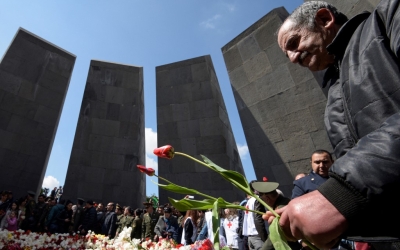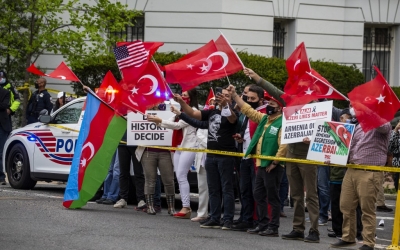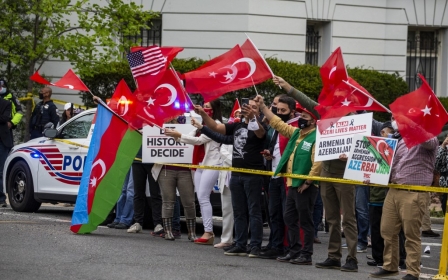Erdogan calls on Biden to reverse 'unfair' Armenian genocide recognition
Turkish President Recep Tayyip Erdogan rebuked on Monday Washington's recognition of the Armenian genocide, warning that the move, which he called a "wrong step", will hinder US-Turkey relations.
Two days after President Joe Biden used the term "genocide" to describe the mass killings of Armenians during the First World War, Erdogan issued a strong objection to the US statement and called on Washington to reverse it.
"The US president has made comments that are baseless and unfair," Erdogan said.
"We believe that these comments were included in the declaration following pressure from radical Armenian groups and anti-Turkish circles. But this situation does not reduce the destructive impact of these comments."
'The US president has made comments that are baseless and unfair'
- Recep Tayyip Erdogan
In a lengthy televised speech after a cabinet meeting on Monday, Erdogan invited US officials to inspect evidence about the massacre in Turkey's archives.
New MEE newsletter: Jerusalem Dispatch
Sign up to get the latest insights and analysis on Israel-Palestine, alongside Turkey Unpacked and other MEE newsletters
The Turkish president also cited US atrocities - including the mass killing and displacement of Native Americans, the bombing of Japan during World War II and the war in Vietnam - calling on America to reflect on its own history.
"Each year on this day, we remember the lives of all those who died in the Ottoman-era Armenian genocide and recommit ourselves to preventing such an atrocity from ever again occurring," Biden said in a statement marking the Armenian Genocide Remembrance Day on Saturday.
"Beginning on April 24, 1915, with the arrest of Armenian intellectuals and community leaders in Constantinople by Ottoman authorities, one and a half million Armenians were deported, massacred, or marched to their deaths in a campaign of extermination."
The killings
Successive US administrations from both major parties had refrained from describing the killings as a genocide.
On Saturday, Biden became the first US president to use the term since Ronald Reagan, who mentioned "the genocide of the Armenians" in a passing reference in 1981.
An estimated 1.5 million Armenians were killed in Ottoman-controlled territory between 1915 and 1923, the majority before 1919, through systematic deportations, starvation and murder.
Most of the killings took place during the First World War. Turkish forces subsequently fought against allied forces, including France, the UK and Russia, which intended to occupy and partition Anatolia during what Turkey calls the Turkish War of Independence.
The description of the mass killings as "genocide" is a sensitive issue for Turkish leaders.
Turkey acknowledges that atrocities took place against Armenians during the war, but says the killings were not a part of a systematic campaign and do not amount to genocide. Azerbaijan likewise disputes the term.
However, about 30 countries recognise the genocide, including France, Canada, Brazil, Germany, Russia, Poland and the Netherlands.
Other countries, such as the UK, have condemned the killings, but believe that they do not meet the definition of genocide as defined by the 1948 UN Convention on Genocide.
On Monday, Erdogan challenged accounts of a deliberate campaign of mass killings of Armenians starting in 1915.
He said there were plans to relocate Armenians within the Ottoman empire because "Armenian gangs" had sided with Russia during the world war and were committing atrocities against Turkish forces and civilians.
"I am speaking based on evidence, unlike Biden. We have over 1 million documents related to the 1915 events in our archives. I am wondering how many documents the United States has," he said, according to the Turkish publication, Daily Sabah.
"Armenian gangs, who were at least 150,000 to 300,000 people, carried out massacres in Turkish territory. Furthermore, they partnered with Russian forces to fight against us. Ottoman authorities took precautions."
Ankara-Washington relations
Erdogan did not announce any retaliatory steps against Washington on Monday amid cooling ties between Ankara and Washington.
Biden and Erdogan are set to meet on the sidelines of a Nato summit in June. After a phone call between the two leaders last week, Biden expressed "interest in a constructive bilateral relationship with expanded areas of cooperation and effective management of disagreements," the White House said in a statement.
Turkey has been a member of Nato since 1952, and it continues to host US nuclear weapons at its Incirlik Air Base.
Turkish-American relations have been plagued with tensions in recent years. Washington has angered Ankara with its military support for Kurdish groups in Syria that Turkey views as a threat to its national security.
Late last year, the US imposed sanctions on Turkey over its purchase of the Russian S-400 missile system. Turkey had also been ejected from the Nato-led F-35 programme to develop advanced fighter jets.
Middle East Eye delivers independent and unrivalled coverage and analysis of the Middle East, North Africa and beyond. To learn more about republishing this content and the associated fees, please fill out this form. More about MEE can be found here.






